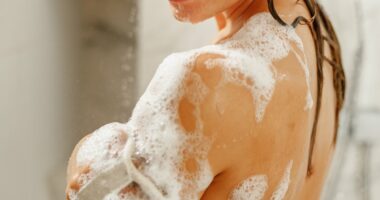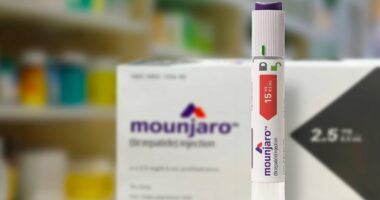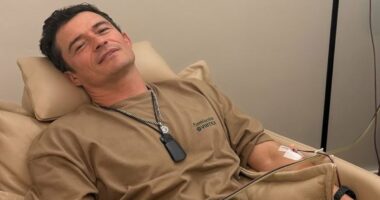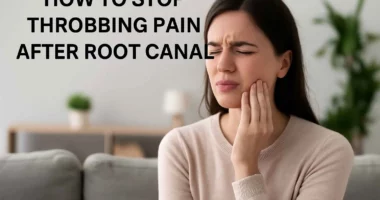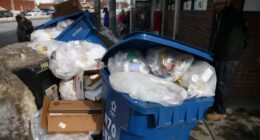Share this @internewscast.com
When Orlando Bloom, 48, was pictured having a £10,000, two-hour treatment to remove microplastics from his blood, it thrust the subject back into the spotlight.
‘Microplastics are the tiny plastic particles that you often can’t see, as they’re less than five millimetres, but they’re everywhere,’ explains Dr Liza Osagie-Clouard, a former surgeon and now founder of Solice, a preventative healthcare clinic.
According to the Plastic Soup Foundation (plasticsoupfoundation.org), a campaigning group that aims to eliminate plastic pollution, microplastics are often generated by the breakdown of larger plastics.
In the oceans plastics enter the food chain when sea life mistakes the fibres and fragments for food, while rubber from car tyres and dust from paint also contribute.
So what’s the issue? Dr Osagie-Clouard says microplastics can cause inflammation, mimic hormones and may also be vehicles for substances that are toxic to the human body, such as heavy metals.
The Plastic Soup Foundation reported microplastics have been found in the blood, lungs, brains, placenta and beyond. They estimate that in a year, the average adult may contain 163,000 particles of microplastics – 121,000 coming from inhalation and 52,000 from ingestion.
So should we all be having Orlando’s pricey procedure? While this type of blood filtering has been around a while, experts aren’t convinced of its efficacy.
Andreea Costina, a biotech engineer and founder of Achillea Beauty says: ‘The World Health Organisation places the present certainty of benefit at low, and lists potential harms including hypotension [low blood pressure], citrate‑induced calcium loss and venous thrombosis [blood clots].

In one year, the average adult may contain 163,000 particles of microplastics according to the Plastic Soup Foundation

Orlando Bloom’s Instagram Stories post with a picture of him undergoing a two-hour treatment to remove microplastics from his blood

‘Microplastics are the tiny plastic particles that you often can’t see, as they’re less than five millimetres, but they’re everywhere,’ explains Dr Liza Osagie-Clouard
‘No peer reviewed trial shows that these sessions clear nanoplastics or improve any health end point.’
Instead, like many others, Andreea recommends simple ways to minimise your exposure and reduce the amount of plastic that might find its way into the environment.
In the bathroom
Swap bottles for bars. The Little Soap Company’s Eco Warrior bars (from £4.50, available in supermarkets) offer cardboard-packaged replacements for everything from shampoo and shaving foam to scrubs, cleansers and body washes.
Bar conditioners aren’t great so try UpCircle’s Conditioner Creme (£19.99, upcirclebeauty.com) which comes in a glass jar that can be refilled. Style with JVN Hair Instant Recovery Serum (from £12, spacenk.com) sold in a glass jar with aluminium lid. Look for wood combs and brushes – UpCircle has a bamboo comb for £9.99.
Ditch synthetic sponges in favour of natural loofahs and konjac sponges. If you’re still using wipes – stop! They’re bad for your skin as well as for the environment. Opt for washable and reusable bamboo pads instead.
When it comes to skincare, Katoa Botanicals (from £48, katoabotanicals.com) and Wildsmith (from £30, wildsmithskin.com) use packaging that looks and feels like plastic but breaks down in a compost heap within a year.
Elsewhere, Kjaer Weis (kjaerweis.com) has refillable paper (from £36) or metal (from £46) compacts for blushers, bronzers, eye shadows and more. Lisa Eldridge’s lusted-after lipsticks now come in refillable cases that are made of aluminium (£49 for case and lipstick, £25 for refills, lisaeldridge.com).
To go entirely plastic-free you might have to ditch make-up brushes – most of them use synthetic fibres – or pay a premium for cruelty-free animal hair and wood ones, such as Wayne Goss First Edition collection (from £13, waynegoss.co.uk).
Plastic-free deodorant comes in the form of Wild’s Starter Kit (from £12, wearewild.com) with refillable aluminium cases and bamboo pulp refill sticks.

Refillable makeup products made of aluminium and glass are one way of reducing the potential number of microplastic particles you come in contact with

Loofahs and konjac sponges are alternatives for synthetic sponges
In the kitchen
Look for glass storage containers, wooden chopping boards, wooden spoons and stainless steel utensils.
When it comes to minimising your exposure, Dr Tracey Woodruff, a professor at the University of California, says: ‘Heat makes plastic release harmful chemicals, so I always microwave in ceramic or glass.’ She also recommends swapping plastic water bottles for glass or stainless steel.
Latest research suggests there’s not much difference between tap and bottled water when it comes to microplastics, so your best bet is to stick with tap water and spend the money on a filtration system instead.
‘You want one that will filter out anything larger than 1 micron [one thousandth of a millimetre]. We recommend the Epic Water Filter’s Nano Filter, which claims to remove 99 per cent of microplastics,’ says Dr Osagie-Clouard.
As for what’s on your plate, Dr Woodruff eats ‘lower on the food chain – more grains, fruits, vegetables.’ Microplastics have the potential to accumulate in animals that are higher up the food chain.
In the laundry
Every time you wear or wash synthetic fabrics, microplastics enter the environment so buy natural fibres – cotton, wool, silk, denim – wherever you can. Think about getting a microfibre filter for your washing machine. PlanetCare (planetcare.org) does them from £75.90.

